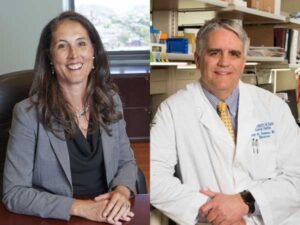David Gius was named associate cancer center director for translational research at the Mays Cancer Center, home to UT Health San Antonio MD Anderson.
Sarasota Memorial Healthcare Foundation has received $25 million from the Brian and Sheila Jellison Family Foundation.
Sidi Chen, assistant professor in the Department of Genetics and Systems Biology Institute at Yale School of Medicine and member of Yale Cancer Center, received a $500,000 grant from Alliance for Cancer Gene Therapy for pancreatic cancer research.
City of Hope has established AccessHope, a wholly owned subsidiary dedicated to serving employers and their health care partners by providing access to City of Hope's cancer expertise.
Jennifer A. Doudna, of the University of California, Berkeley, and Emmanuelle Charpentier, of the Max Planck Unit for the Science of Pathogens in Germany, have won the 2020 Nobel Prize in Chemistry for the development of the CRISPR/Cas9 genome-editing system.
Harvey J. Alter, Michael Houghton, and Charles M. Rice received the Nobel Prize in Physiology or Medicine for the discovery of hepatitis C virus.
NCI has awarded 25 grants and contracts as part of the Serological Sciences Network initiative.
Last week, a national public perception survey from the American Society of Clinical Oncology revealed a public grappling with cancer care amid the COVID-19 pandemic and the nation's reckoning with racial injustice.
One of my concerns about the data is that it is a mix of NCI (61) and non-NCI centers (17). I am convinced from my own personal knowledge of the NCI centers, that if you looked solely at the NCI centers—this diversity data would be significantly worse. I think the survey data is skewed by the inclusion of non-NCI centers and if we looked solely at those, there would be far less diversity in race/ethnicity and sex among directors/associate directors.
Diversity, inclusion, and equity are important issues, not only to our nation's cancer centers, but to our nation as a whole. To embody these values, we must work to close gaps in cancer research and care.










